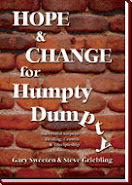
Every week I get a podcast from Stanford University that focuses on educating students about "Social Innovation" and developing "Social Entrepreneurs".
http://www.gsb.stanford.edu/exed/epse/The pod casts are very exciting because they offer case studies of people who have decided to "Do good while doing well". In fact, Stanford seems to be ahead of Christian colleges and universities in the respect that they are tirelessly and ceaselessly pursuing charitable goals while operating on sound business principles. I rarely see Christians who are so intentionally and thoughtfully pursuing such a holistic vision. (Let me know if I am wrong!)
However, all is not well in this arena. Some are upset that business entrepreneurs are now getting into charity. Read the story below from "The Journal of Philanthropy".
http://philanthropy.com/giveandtake/The debate about so-called
philanthrocapitalism has jumped the Atlantic.
In an
opinion article in The Guardian newspaper, in London, Tristram Hunt, a history professor, writes that Google.org, the Bill & Melinda Gates Foundation, and other groups that mix philanthropy and business practices will not solve health inequities and global poverty.
Such donors have “little engagement with the kind of structural injustices — racial, economic, social — or broader environmental, demographic or strategic challenges that require political advocacy. Having made their riches from the existing free-market model, venture philanthropists see little need to confront its problematic aspects,” he writes.
In a
letter to the editor, Kurt Hoffman, director of the Shell Foundation, disagrees because
“Many of these new actors have been motivated precisely because governments and charities have failed for decades to deliver, particularly in the developing world, where the delivery of aid has an atrocious record. Do we want to continue with the status quo or apply some fresh, inherently efficient and potentially very effective thinking to find new solutions to old problems?” he asks.
What do you think?
— Ian Wilhelm
I think we need a lot of new and fresh models. Many of the new and the old models failed and are failing. However, that is one reason we desperately need business practices that experiment and then evaluate what works. I have a simple philosophy:
"If it works-Do more of it."
"If it does not work-Stop it."
"If it ain't broke-Don't fix it."





No comments:
Post a Comment